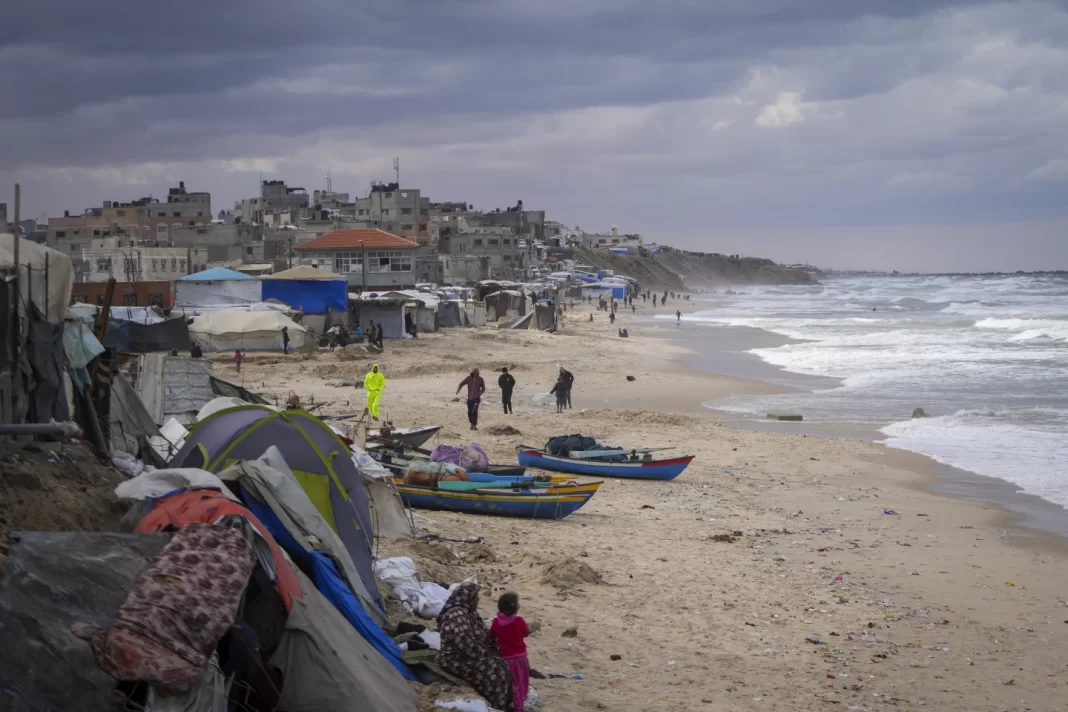For many across the Middle East, the Israel-Hezbollah ceasefire came as a relief: the first major sign of progress in the region since war began more than a year ago.
But for Palestinians in Gaza and families of hostages held in the territory, the news appeared only to inaugurate a newer, grimmer period of the conflict there. For them, it marked yet another missed opportunity to end fighting that has stretched on for nearly 14 months.
Palestinians had hoped that any ceasefire deal with Hezbollah would include a truce in Gaza as well. The families of people kidnapped when Hamas-led militants stormed southern Israel in October 2023, meanwhile, wanted part of the agreement to include returning their loved ones. Instead, the ceasefire was confined only to the fighting in Lebanon.
“We feel this is a missed opportunity to tie in the hostages in this agreement that was signed today,” said Ruby Chen, whose son, Itay Chen, was taken hostage from an Israeli military base and has been declared dead.
As much as they were intertwined, the two wars have been very different. In Lebanon, Israel said its aim was to drive Hezbollah back from the countries’ shared border and end the militant group’s barrages into northern Israel. The ceasefire that took effect Wednesday is intended to do that.
In Gaza, Israel’s goals are more sweeping. Prime Minister Benjamin Netanyahu has been resolute in insisting that Hamas must be completely destroyed and Israel must retain lasting control over parts of the territory. Months of talks have failed to get Netanyahu to back down from those demands — or to convince Hamas to release hostages under those terms.
For Palestinians in Gaza, that means continuing misery under an Israeli campaign that has demolished much of the territory and driven almost the entire population from their homes. Hundreds of thousands are going hungry while living in squalid tent cities as the second winter of the war brings cold rains and flooding.
”They agree to a ceasefire in one place and not in the other? Have mercy on the children, the elderly and the women,” said Ahlam Abu Shalabi, living in tent in central Gaza. “Now it is winter, and all the people are drowning.”
Palestinians Feel Resigned to Continued War
The war between Israel and Hamas began on Oct. 7, 2023, when militants attacked Israel from Gaza, killing around 1,200 people and taking some 250 hostage. Israel’s retaliatory offensive has rained devastation on the Palestinian territory, killing over 44,000 people, according to local health officials. The officials, who do not distinguish between civilians and fighters in their count, say over half of the dead are women and children.
Hezbollah began firing into Israel a day after Hamas’ attack in solidarity with the Palestinian militant group. The two sides have exchanged near-daily barrages since. Moving thousands of troops to its northern border, Israel ramped up bombardment of southern Lebanon and launched a ground invasion there two months ago, killing many of Hezbollah’s leaders.
Palestinians now fear Israel’s military can return its full focus to Gaza — a point that Netanyahu made as he announced the ceasefire in Lebanon on Tuesday.
“The pressure will be more on Gaza,” said Mamdouh Younis, a displaced man in a central Gaza tent camp. Netanyahu, he said, can now exploit the fact that “Gaza has become alone, far from all the arenas that were supporting it, especially the Lebanon front.”
Israeli troops are already engaged in fierce fighting in Gaza’s north, where a two-month offensive has cut off most aid and caused experts to warn a famine may be underway. Strikes all over the territory regularly kill dozens.
In signing onto the ceasefire deal, Hezbollah reversed its long-held position that it wouldn’t stop its barrages across the border unless Israel ends the war in Gaza.
“This could have a psychological impact, as it will further entrench the understanding that Palestinians in Gaza are alone in resisting against their occupiers,” said Tariq Kenney Shawa, a U.S. policy fellow at Al-Shabaka, a Palestinian think tank.




